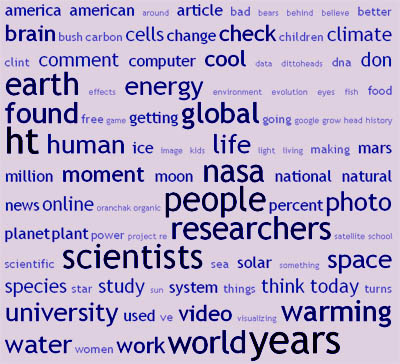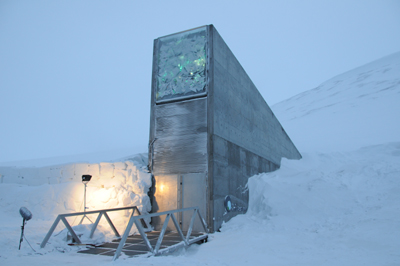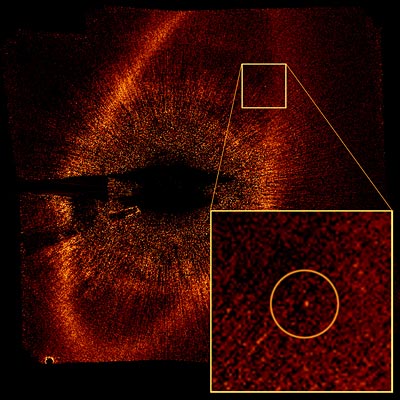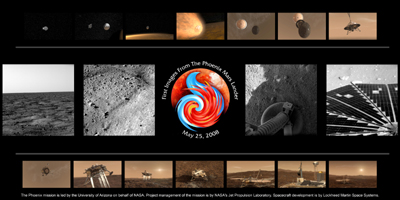 Science Etcetera 2008 Tag Cloud Via TagCrowd |
CNN making the boneheaded decision to dump its science unit, the Origin of Blue Eyes fitting another interesting piece of the human origins puzzle into place, and “Dwarf Planets” becoming “Plutoids” earn an honorable mention for science news in 2008, and the Large Hadron Collider will make next year’s top 10 list, when it starts working properly.
Here are my picks for the best science developments in 2008:
- The Svalbard Seed Vault in Longyearbyen, Norway went into deep freeze, preserving the world’s seed collections against any number of threats, from Global Warming to regional environmental damage. The vault is a monument to prescient thinking, an Ark for weathering our current environmental storms.
- Once numbered at less than 100,000, a recent census found 125,000 western lowland gorillas found living in the Republic of Congo. Although still listed as “critically endangered,” the numbers show that conservation efforts do work, and that similar actions must be taken for other primates around the world.
- The Interior Department officially listed the polar bear as a threatened species, acknowledging melting sea ice as the culprit, but without taking any position on Global Warming.
- The first Photo of an Exoplanet was confirmed from two photographs taken by the Hubble Space telescope in 2004 and 2006, a Jupiter-mass object that orbits the star Fomalhaut every 872 years.
- Closer to home an Electron was filmed for the first time, riding on a light wave after being pulled away from an atom.
- The Genetic Information Nondiscrimination Act (GINA) was signed into law, which bars discriminating against people based on their genetic information concerning health insurance and employment.
- The Phoenix Lander proved conclusively the existence of water on Mars, and kept us on the edge of our seats with its electrical problems and issues getting soil samples into its ovens for analysis.
- Craig Venter’s organization synthesized an entire bacterial genome from scratch, the second of three steps toward JCVI’s goal of creating a fully synthetic organism.
- Working models and computer simulations of the Antikythera device revealed the Greeks were using a very sophisticated astronomical calculator, which was also capable of predicting eclipses and the Olympic Games 2,100 years ago.
- My personal favorite development for this year was Science Debate 2008, which successfully got the presidential candidates Barack Obama and John McCain to answer questions about science, and, even more amazingly, brought the scientific community together into its most effective lobby, which is like herding cats.
 Svalbard Seed Vault |
 Planet Orbiting the star Fomalhaut Every 872 Years |
 First Images from the Phoenix Mars Lander |
 Science Debate 2008 |
Other News Sources Take on the Year in Science:
- Discover Top 100 Stories of 2008
- Discovery 10 Stories You May Have Missed in 2008 (But Shouldn’t)
- Science’s Breakthrough of the Year
- CBC News 2008: The Year in Science
- Live Science Top 5 Incredible Science Discoveries of 2008
- Charlotte Examiners Top 10 Science Stories of 2008
- TIME’s Top 10 Scientific Discoveries
- NPR Science Friday The Biggest Science Stories of 2008
- National Geographic TOP TEN NEWS STORIES: Most Viewed of 2008
- New Scientist News review 2008: The year in science
- New Scientist Most extreme news stories of 2008
- Wired Top 10 New Organisms of 2008
Comments
2 responses to “2008 Year in Science Review”